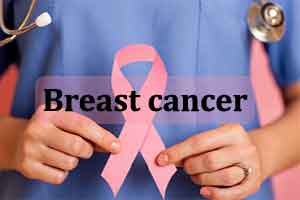- Home
- Editorial
- News
- Practice Guidelines
- Anesthesiology Guidelines
- Cancer Guidelines
- Cardiac Sciences Guidelines
- Critical Care Guidelines
- Dentistry Guidelines
- Dermatology Guidelines
- Diabetes and Endo Guidelines
- Diagnostics Guidelines
- ENT Guidelines
- Featured Practice Guidelines
- Gastroenterology Guidelines
- Geriatrics Guidelines
- Medicine Guidelines
- Nephrology Guidelines
- Neurosciences Guidelines
- Obs and Gynae Guidelines
- Ophthalmology Guidelines
- Orthopaedics Guidelines
- Paediatrics Guidelines
- Psychiatry Guidelines
- Pulmonology Guidelines
- Radiology Guidelines
- Surgery Guidelines
- Urology Guidelines
Survival of breast cancer patients improved by irradiation of lymph nodes

Giving radiation therapy to the lymph nodes located above the collarbone and behind the breastbone to patients with early-stage breast cancer improves overall survival without increasing side effects, and this effect continues for 15 years, according to a study.
The findings of the study will be presented by professor Philip Poortmans, head of the department of radiation oncology at the Institut Curie, Paris, France at the annual American Society for Clinical Oncology (ASCO) Congress.
Lymphatic drainage from breast cancer to the regional lymph nodes implies that the cancer is more likely to spread to other parts of the body. This drainage follows two pathways. The best known is to the axilla (armpit), and these lymph nodes are usually treated by surgery and/or radiation therapy. The second pathway drains to the internal mammary (IM) lymph nodes behind the breastbone, and probably from there to those just above the collarbone, the medial supraclavicular (MS) nodes. Because of uncertainty about the effects of treatment in this area, and particularly concerns about the increased toxicity that might be caused by the irradiation of a larger area, until recently only about half of radiation oncology centers treated the IM-MS lymph nodes.
The international randomized trial was carried out by the European Organisation for the Research and Treatment of Cancer (EORTC) that involved analysis of 4004 patients with stage I to III breast cancer from 43 centers.
Key Findings:
- After a median follow-up of 15.7 years, the researchers found a significant reduction in deaths from breast cancer (16.0% in the treatment group vs. 19.8% in the control group), and in the return of breast cancer in patients who had received radiation to the IM-MS nodes (24.5% vs. 27.1%).
- Overall survival was 73.2% in the IM-MS group and 70.8% in the control group.
- There was no increase in non-breast cancer-related mortality in the first group and to date, there has been no increased level of serious complications related to the treatment.
- There was no difference in the incidence of second cancers, cancer in the other breast, or deaths from cardiovascular disease between the two groups.
"Our results make it clear that irradiating these lymph nodes gives a better patient outcome than giving radiation therapy to the breast/thoracic wall alone. Not only have we shown that such treatment has a beneficial effect on disease control, but it also improves breast-cancer related survival," said Dr. Poortmans.
Using IM-MS radiation therapy in patients at low risk of their cancer spreading outside the breast may be given less intensive systemic therapy in order to spare them side effects, can improve their outcome by eradicating residual tumour cells in the breast/thoracic wall. For patients at high risk of metastases, who receive systemic therapy, the prospect of cure is also related to the chance of leaving residual tumour cells behind throughout the body. In these cases too, the ultimate outcome can be improved by using effective locoregional treatment to eradicate disease at the site where it is most likely to be present, the researchers say.
"The results of our trial, in which the patients received appropriate systemic treatments, contradict the existence of a 'competition' between locoregional and systemic treatments," says Prof Poortmans. "Because there is a rather positive interaction between these treatments, in many patients their combination will result in an enhancement of the combined benefits; in other words, one plus one can equal more than two."
The researchers say that the rate of side effects was low, the vast majority were of low grade, and many of them were only temporary. "It is very important that we record all possible events, including recurrence and toxicity, and an even longer follow-up will also give us the opportunity to continue evaluating our patients in other areas, for example, quality of life and well-being," said Prof Poortmans.
"Advances in radiation therapy techniques and new therapies, and earlier diagnosis may increase the benefit from IM-MS radiation treatment. But we believe that our trial has already given solid evidence of the benefits of radiation treatment of the IM-MS lymph nodes, and we hope that such treatment will stay where it is and become where it isn't standard clinical practice for selected patients with early-stage breast cancer," he concludes.

Disclaimer: This site is primarily intended for healthcare professionals. Any content/information on this website does not replace the advice of medical and/or health professionals and should not be construed as medical/diagnostic advice/endorsement or prescription. Use of this site is subject to our terms of use, privacy policy, advertisement policy. © 2020 Minerva Medical Treatment Pvt Ltd